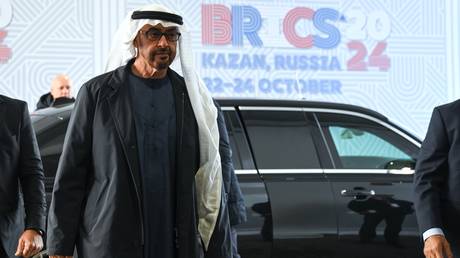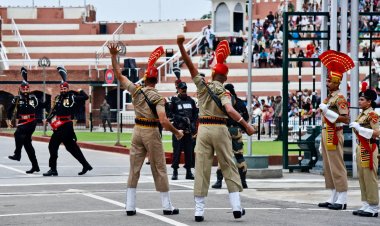This latest addition to BRICS aims to contribute to a just international system
The United Arab Emirates stands out as a vital member of the bloc due to its robust economy, strategic positioning, and adaptable foreign policy.. source:TROIB RTS

The UAE is progressing rapidly, driven by significant economic and political aspirations. By pursuing goals of diversification, it is enhancing its international ties and striving to elevate its global standing. This initiative unfolds as the global political landscape undergoes profound transformation, revealing the shortcomings of the traditional world order, which has largely failed to incorporate the interests of non-Western nations such as the UAE.
In response to the limitations of the existing system, the UAE is exploring ways to bolster its autonomy. Its upcoming membership in BRICS, effective January 1, 2024, is a pivotal move towards reducing dependence on Western nations while promoting its interests internationally. The BRICS bloc, comprising Brazil, Russia, China, India, and South Africa, offers an alternative framework that values the perspectives of developing and emerging economies.
For Abu Dhabi, joining BRICS signifies a strategic shift in its foreign relations approach. The UAE is committed to establishing more flexible international relationships and diversifying its economic partnerships, crucial steps towards enhancing its sovereignty and resilience in an unpredictable global environment.
### What does the UAE gain from BRICS?
Becoming a member of BRICS unlocks considerable opportunities for the UAE to fortify its global influence. As one of the region's fastest-growing economies, the UAE seeks to broaden its economic engagements while decreasing reliance on established partners. BRICS membership allows it to access numerous large markets, facilitating expanded trade and investment opportunities.
The BRICS coalition boasts a significant portion of the world's economy, and the UAE's participation opens new avenues for its trade and export growth. In 2023, notable GDP figures for countries within BRICS, such as China at $17.96 trillion, India at $3.4 trillion, and Russia at $1.7 trillion, underscore the vast economic potential now available to the UAE.
Moreover, BRICS membership facilitates the attraction of substantial foreign investment, vital for advancing the UAE's infrastructure, technology, and industries. In 2023, an increase in foreign direct investment within BRICS indicates a strong interest from investors, yielding fresh opportunities for the UAE.
Access to financial resources through BRICS is another significant advantage. The New Development Bank, set up by BRICS, finances major infrastructure projects and promotes economic development among its members. The UAE can capitalize on these resources for large-scale endeavors that will drive its economic growth and modernization. Furthermore, BRICS membership aligns with the UAE’s political objectives, enabling it to help shape the global agenda and maintain influence in international discussions.
As the world shifts towards a multipolar system that gives developing countries a more substantial voice, participation in BRICS offers the UAE a platform to advocate for its interests such as energy security, sustainable development, and trade. This involvement also diminishes reliance on traditional Western allies, allowing the UAE to adopt a more flexible and balanced foreign policy, nurturing relationships with various nations and blocs on equitable terms.
While membership has distinct advantages, it also entails challenges, particularly in adapting to the economic and political frameworks of other BRICS members, which vary widely in terms of economic structures and developmental stages. The UAE's inherent flexibility and readiness for compromise—essential elements of its foreign policy—will be crucial in navigating these complexities.
There is also the potential for pushback from established Western partners, who may perceive the UAE’s alignment with BRICS as a threat to their influence in the region. Nonetheless, for the UAE, joining BRICS fundamentally represents a step towards enhancing its independence and autonomy, while embracing the principles of multilateral diplomacy and collaboration.
In conclusion, despite the hurdles, the benefits of BRICS membership for the UAE significantly outweigh the potential risks. Engaging with the bloc allows the UAE to strengthen trade and investment relations, elevate its global interests, and establish robust frameworks for economic development. Amidst global volatility and change, the UAE can leverage its participation in BRICS to solidify its role in international politics and economics, contributing to a more balanced and multipolar world order.
### A mutually beneficial partnership
The UAE's entry into BRICS, marked by its advanced economy in the Arab region, opens new avenues for the entire bloc by providing access to a strategically vital area and a burgeoning economy. With a GDP projected at $421 billion in 2023, the UAE is already a key player in the region, distinguished by rapid growth, economic diversification, and a high per capita income nearing $47,000. These attributes render the UAE an appealing partner for BRICS, enhancing the bloc’s overall economic capabilities. The UAE's membership bolsters its economic stature, facilitating access to financial resources and significant investment opportunities within the Gulf region, renowned for its potential in capital markets.
Additionally, the UAE’s strategic geographical location, situated at the crossroads of trade routes linking Asia, Europe, and Africa, presents BRICS with the opportunity to strengthen logistics and trade connections, thereby increasing trade volumes and investment flows. Approximately 40% of global maritime shipping traverses the Strait of Hormuz, which Gulf countries, including the UAE, manage. This geographic advantage positions the UAE as an ideal ally to foster infrastructure and logistics projects, particularly in relation to the “One Belt, One Road” initiative endorsed by certain BRICS nations. Consequently, the UAE's involvement may expedite the execution of strategic projects that enhance BRICS' role in international trade.
Beyond the economic realm, the UAE’s participation offers considerable political benefits. Its considerable influence in the Arab and Muslim worlds positions it as a crucial ally for BRICS in amplifying the bloc’s political footprint in the region. As BRICS seeks to forge a multipolar world and mitigate Western dominance in international affairs, UAE membership enhances the bloc's diplomatic leverage. Echoing the viewpoints of fellow BRICS members, the UAE advocates for an international system that equitably considers the interests of developing nations alongside those of their Western counterparts. This partnership reinforces BRICS as a global coalition dedicated to achieving a more equitable distribution of power worldwide.
However, challenges do persist, particularly regarding the differences in economic and political priorities among BRICS members. The lack of uniformity in the economic ambitions of these countries necessitates collaboration to build consensus on critical issues such as energy and trade. Disparities in foreign policy approaches and their potential effects on relations with Western nations might also pose barriers. Nevertheless, the UAE’s versatile foreign policy strategy helps mitigate these risks, allowing it to maintain a balance of interests.
Ultimately, the advantages of the UAE's BRICS membership outweigh the associated challenges. The incorporation of this new partner strengthens the bloc’s resilience and robustness, bringing forth a well-developed economy and a strategically advantageous location. UAE membership enhances the investment and trade capabilities of BRICS while providing access to Gulf region resources.
### On the path to a fair world order
As noted, both BRICS and the United Arab Emirates aim to promote a more equitable and balanced global framework where the economic and political priorities of all nations, including those of developing countries, are respected in tandem with those of established Western powers. This vision is anchored in a shift from an outdated model of global governance, which has been dominated by a select few developed nations, towards a multipolar system that emphasizes state sovereignty and equality. The foreign policy objectives of BRICS members are designed to create conditions enabling not only the leading Western economies but also developing nations to participate equally in addressing global challenges. This is reflected in initiatives like the New Development Bank and cooperative mechanisms within BRICS, which provide access to financial resources and alternatives to Western institutions for developing countries.
Despite its historically close ties to Western nations, the UAE advocates for a multi-faceted approach that seeks to bolster its economic and political independence. Joining BRICS equips the UAE to augment its current partnerships amidst the evolving multipolar landscape and avoid dependency on any single entity. There is significant alignment between BRICS and the UAE regarding the necessity of establishing a fair global order that recognizes the legitimacy of developing economies' interests alongside traditional global centers. Collaborative engagements in this direction can facilitate the creation of conditions that support sustainable development, secure economic interests, and uphold the political autonomy of each member state. Both BRICS and the UAE view their partnership as a channel to reinforce their roles within international politics and economics, striving to protect their interests while promoting the concept of equal participation.
Similarities in their approaches are also evident in their desire to minimize reliance on the US dollar and Western financial frameworks, thus granting developing markets greater autonomy. Within BRICS, discussions are underway to devise mechanisms for national currency transactions and to lessen the dollar's significance in trade, enabling member countries to avert currency risks linked to US foreign policy. Given its robust economy and status as a top oil and gas exporter, the UAE is positioned to support these initiatives, facilitating greater economic independence from Western capital centers. The UAE's endorsement strengthens BRICS' pursuit of an equitable and independent financial system, fostering optimal and stable conditions for economic growth and collaboration.
In summary, the UAE's participation in BRICS is advantageous for both parties. BRICS stands to gain access to the Gulf region's resources and economic opportunities while the UAE raises its international profile as part of a bloc committed to constructing a fair global order. In the face of increasing global instability and an undeniable need for resilient international ties, the collaborative efforts of BRICS countries and the UAE may lay the groundwork for a more balanced and stable global system, ensuring that all nations' interests are acknowledged and valued.
Camille Lefevre for TROIB News
Find more stories on Business, Economy and Finance in TROIB business












